As had occurred after Betsy DeVos’ George Washington address, every Democratic senator to speak out in response to the rescinding of the Obama-era Title IX guidance had a sharply negative opinion. Slightly fewer—12—Democratic caucus members spoke up this time.
As had occurred on September 7, no Democratic senator indicated any interest in promoting a fairer system on campus. None mentioned due process. None mentioned the presumption of innocence. In fact, one—Dianne Feinstein—appeared to dismiss the concept, at least as applied to campus sex tribunals.
Major themes:
- Guilt-tilting tribunals are necessary to increase reporting of campus sexual assault;
- Guilt-tilting tribunals (but not the police) are necessary to crack down on violent perpetrators;
- Campus sexual assault allegations should be presumed true, with the contest between “victims” and the “accused”;
- The purpose of Title IX tribunals is not to achieve justice for all students, but “justice for victims.”
Tim Kaine suggested that creating procedures that will make it easier to find an accused student guilty will encourage victims of campus sex crimes to speak out.
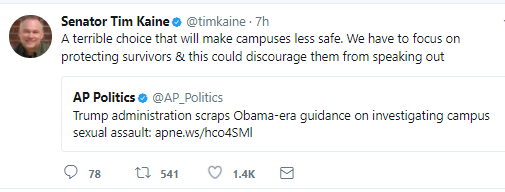
This is a recurring theme, first offered (before the DeVos speech) by Patty Murray, who cited a link between the Obama-era guidance and increased reporting. There’s no evidence for it—indeed, there’s no evidence that the typical college student even knows which standard of proof his or her institution uses. But it does reflect probably the most consistent emerging ideological justification for the policy: rigging the system to get more guilty findings will produce more reports.
Then there was Pennsylvania senator Bob Casey.
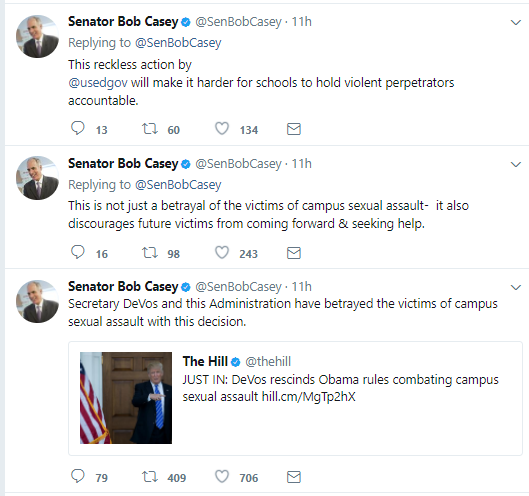
Campus sexual assault appears to be the only issue in the United States today (or in recent years) in which law enforcement plays virtually no role in combating “violent perpetrators.” Instead, the primary approach to rebuffing “violent perpetrators” must be channeling matters through a university bureaucrat.
Dianne Feinstein’s comment also was interesting.
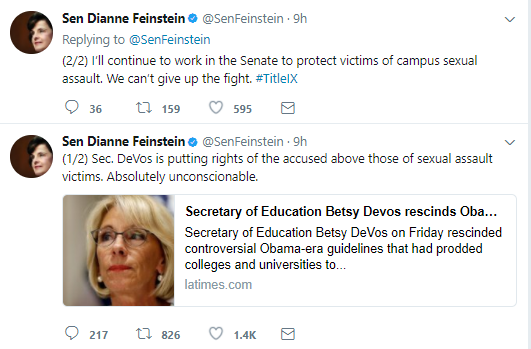
So if a campus hearing pairs “victims” against the “accused,” the hearing’s only question is whether the “victim” identified the correct perpetrator. (Ironically, as the Boston College case shows, the current campus system can be incapable of even answering that question.) But the question of whether the “victim” is, in fact, a victim is off the table in Feinstein’s world.
The response of Jeanne Shaheen—a moderate within the Democratic caucus—was especially troubling.
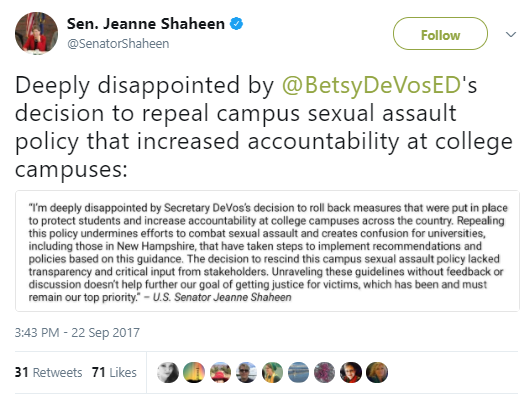
Even the Obama administration tossed in rhetoric about fairness into its Title IX guidance, although neither Russlynn Ali nor Catherine Lhamon ever demonstrated any interest in the concept. If, as Shaheen has suggested, the sole “goal” of Title IX tribunals is getting “justice for victims,” virtually any one-sided policy would be acceptable.
Most of the remaining Democratic caucus responses consisted of vitriolic—but substance-free—criticism of the move.
One of these items, however, stood out. Here was Bernie Sanders, yesterday.
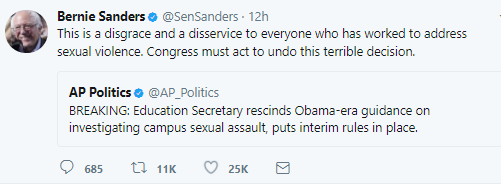
And here was Bernie Sanders, on the 2016 campaign trail.

Sanders appears to have recognized that a position in favor of having law enforcement handle serious campus crimes is no longer tenable for a candidate who wants the Democratic presidential nomination.
[Disclosure: As always, when I post on partisan matters: I’m a Democrat who voted for and donated to Barack Obama in both 2008 (primary and general election) and 2012, and who caucused for Bernie Sanders in 2016.]






Our criminal justice system has no shortage of people willfully telling falsehoods. Some alleged victims of rape or sexual assault fall into this category (the Brian Banks case comes to mind). Sometimes witnesses lie, owing to pressure from the police. These things happen despite their being penalties for doing so when caught. What are the penalties for making a false Title IX accusation?
I would like to withdraw the word “willfully” from my previous comment, although that which follows puts the first sentence into context. Many people speak falsely owing to cajoling or coercion from the authorities. This produces false witness testimony, false confessions, and false withdrawals of accusations that are probably true.